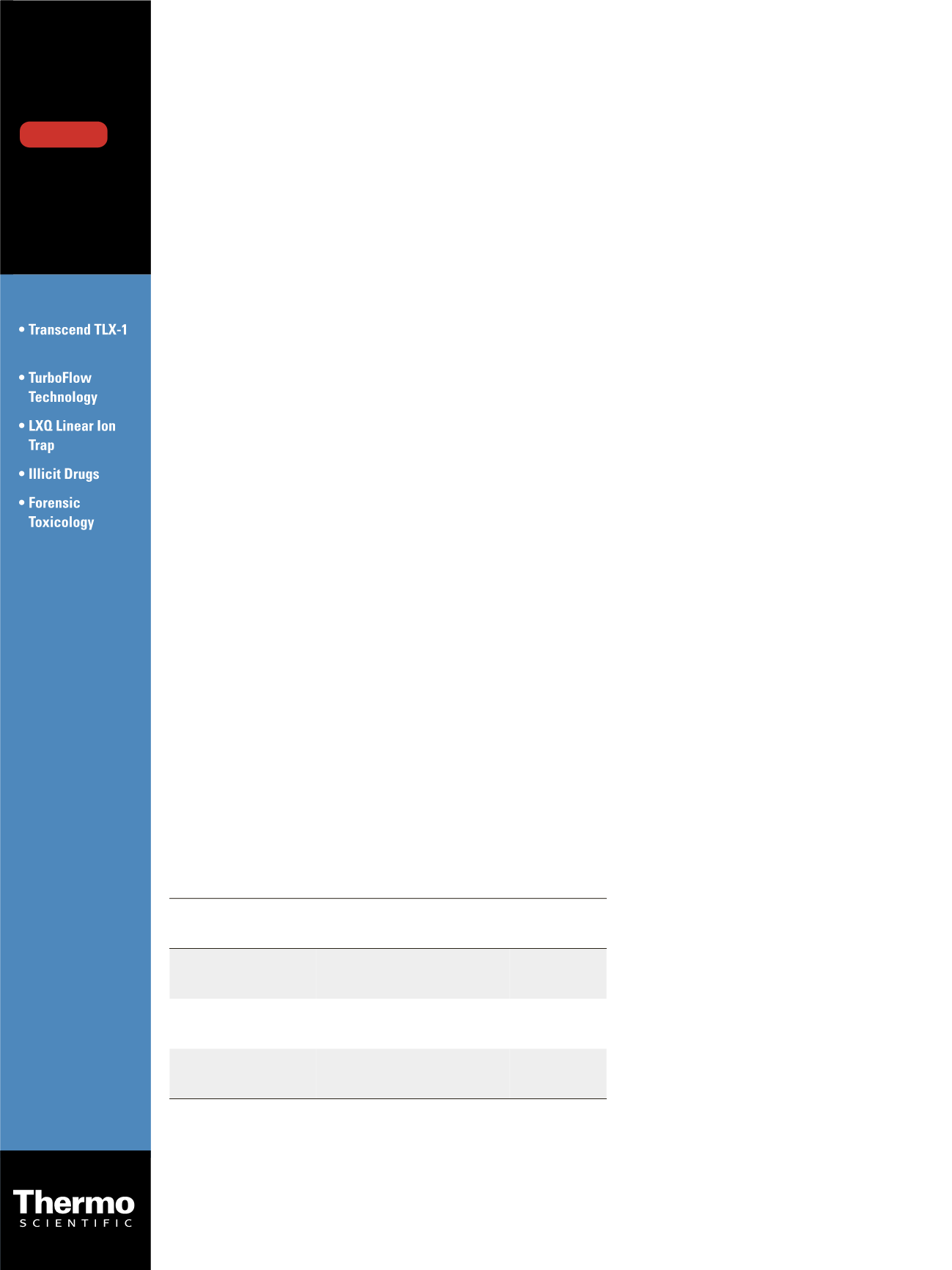

A Fully Automated LC-MS Screening System
using Automated Online Sample Preparation
for Forensic Toxicology
Mueller, D.M.
1
; Duretz, B.
2
; Espourteille, F.A.
3
; Rentsch, K.M.
1
1
Institute for Clinical Chemistry, University Hospital, Zurich, Switzerland;
2
Thermo Fisher Scientific, Les Ulis, France;
3
Thermo Fisher Scientific, Franklin, USA
Introduction
Liquid chromatography-mass spectrometry (LC-MS)
is a powerful tool widely used for forensic targeted drug
screening. However, the quality of the results is highly
affected by the sample preparation. Offline solid phase
extraction (SPE) and liquid-liquid extraction (LLE) are
widely used, but these methods are often time-consuming
and costly. To provide a fast and sensitive approach,
an automated online sample preparation method using
Thermo Scientific Transcend TLX-1 system powered by
TurboFlow
TM
technology for the forensic toxicological
screening of more than 400 acidic, neutral, and basic
drugs in urine with LC/MS
n
has been developed.
Goal
To evaluate the performance of an automated online
sample preparation method for an LC/MS
n
screening
approach.
Experimental
Sample preparation was performed by an online
sample extraction method utilizing Thermo Scientific
TurboFlow technology. Two TurboFlow columns
(Cyclone, C18XL) were connected in series and used for
sample extraction. Urine samples were run both natively
and after enzymatic hydrolysis. The eluent was then
transferred to the LC column (Thermo Scientific Betasil
Phenyl-Hexyl, 100 x 3 mm, 3 µm) for separation.
A 30-minute gradient from 1% to 98% organic was
employed for separation of the analyte with flow rates
of 300 µL/min. All samples were then analyzed on a
Thermo Scientific LXQ linear ion trap mass spectrometer
with the atmospheric pressure chemical ionization (APCI)
source. A data-dependent polarity switching method was
used for data acquisition. MS
2
and MS
3
spectra were
acquired. Since polarity switching was used, a single
injection of a sample containing unknown compounds was
sufficient to detect both substances ionizing in negative
and positive mode. The data was automatically processed,
post-acquisition, by Thermo Scientific ToxID automated
screening software.
Results and Discussion
The method using online extraction has been fully vali-
dated. A minor matrix effect (suppression < 5%) was
observed for over 98% of the compounds. A recovery of
more than 90% was seen in 90% of the substances.
The limit of identification (LOI) was below 10 ng/mL for
60% of the substances and 90% could be identified at a
concentration of 100 ng/mL. The 400-compound library
contains both MS
2
and MS
3
spectra. MS
3
spectra bring
an additional level of specificity, although in most cases,
the analytes can be easily identified by using only the
MS
2
spectra. However, some analytes may have the same
molecular weight, very similar MS
2
spectra, and a very
close retention time. For these reasons, MS
3
data have to
be used for the identification. One example is the isobaric
compounds O-desmethylvenlafaxine and
tramadol. The two analytes have the same
molecular weight, very close retention
times (see details in Table 1), and the
same MS
2
spectra (Figure 1). Therefore,
by running only MS
2
experiments,
it is impossible to properly differentiate
the two analytes. When MS
3
spectra are
recorded, tramadol does not fragment
ions while O-desmethylvenlafaxine
gives a specific spectrum (Figure 1).
Therefore, the analytes can be properly
identified. Total run time of the
analysis is 30 minutes. An example
of a chromatogram obtained from a
sample is presented in Figure 2.
Application
Note: 524
Key Words
system
Table 1. Tramadol and O-desmethylvenlafaxine information
O-Desmethylvenlafaxine
Tramadol
Precursor mass
264.3
264.3
MS
2
Fragment
246.3
246.3
Retention Time
10.6 min
10.3 min
DOWNLOAD


















